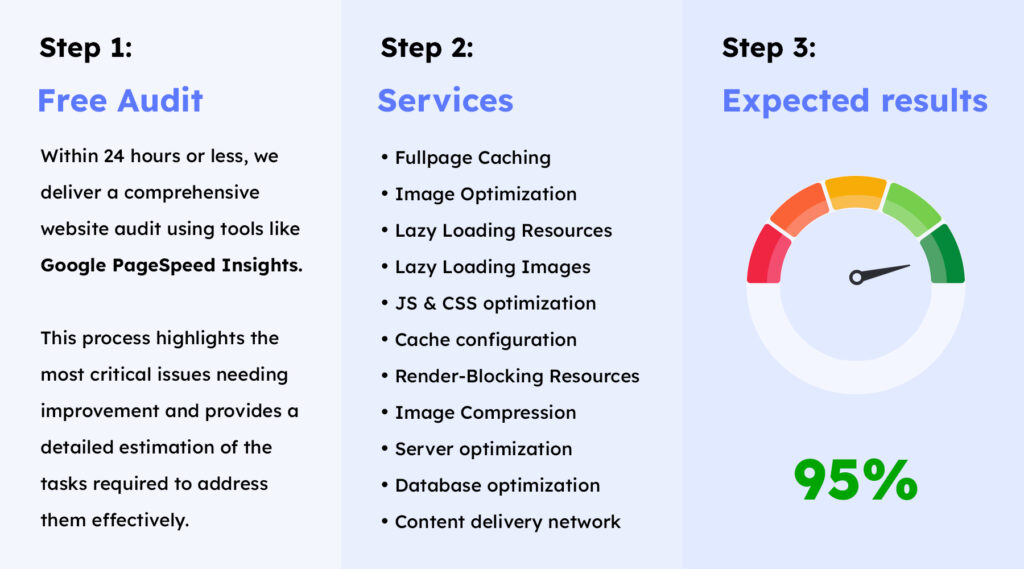Performance Metrics Audit: How to Improve Your WordPress Website’s Efficiency
Every website aims to engage users, drive interactions, and benefits from a Performance Metrics Audit to ensure optimal performance. However, when performance metrics drop, the consequences can be severe. Conducting a Performance Metrics Audit can help identify and address these issues effectively. Users often abandon slow websites in search of alternatives, leading to reduced traffic. Search engines, noticing these issues, deprioritize such pages, causing a decline in visibility. Ultimately, the business loses potential revenue. Regular WordPress Website Performance Metrics Audits are essential to prevent these outcomes.
Our Approach to Performance Metrics Audits
At IRON Web Dev, we follow a structured approach to auditing WordPress website performance, ensuring every critical aspect is thoroughly evaluated:
- HTTP/2 Support Check: We examine whether your hosting server supports HTTP/2, ensuring faster and more efficient communication between browsers and servers.
- Redirect Analysis: Redirect chains can harm loading speed. By identifying unnecessary “hops” in these chains, we help maintain optimal performance.
- PHP Version Audit: Outdated PHP versions can disrupt website functionality. We assess the PHP version and recommend updates to ensure stability and security.
These technical factors are challenging to evaluate independently, which is why we offer professional audits tailored to your site’s needs.
Performance Metrics Audit: Why Page Loading Speed Matters
Search Engines Penalize Slow Sites: Since 2010, Google has used page speed as a ranking factor. Even with excellent WordPress SEO and content, a slow website struggles to gain traction in search results. Regular audits and optimizations are vital to maintain visibility.
User Experience is Key: Beyond search engines, users are less likely to interact with slow-loading pages. High bounce rates signal dissatisfaction, further affecting rankings and conversions.
Common Performance Bottlenecks
Through our audits, we identify key factors that slow down your site:
- Unoptimized Images: Large image files can consume bandwidth, slowing loading times. Optimization is crucial for performance.
- Lack of Caching: Without caching, frequently used elements reload unnecessarily, increasing server strain.
- Bloated Code: Unnecessary characters, comments, and inline styles can weigh down your site. Streamlining the code improves speed.
- Excess Plugins: Unused or redundant plugins can significantly slow a site. We review and recommend removing non-essential plugins.
Performance Metrics Audit: Tools We Use
Our team employs both manual analysis and advanced tools to provide comprehensive insights:
- GTmetrix: For analyzing speed indicators such as LCP, CLS, and FCP, helping pinpoint the main causes of slowdowns.
- PageSpeed Insights: This Google tool offers reports on mobile and desktop performance, with actionable optimization suggestions.
- Lighthouse: Used to evaluate SEO, web application compatibility, and accessibility.
Core Web Vitals and Their Impact
Core Web Vitals are essential metrics for understanding user experience and search engine performance:
- LCP (Largest Contentful Paint): Measures the time taken for the largest visible content to load. Optimization steps include reducing server response times and compressing images.
- CLS (Cumulative Layout Shift): Evaluates visual stability during page rendering. Fixes include defining media sizes and optimizing animations.
- FID (First Input Delay): Tracks the delay between user interaction and browser response. Improvements involve reducing JavaScript execution times.
- FCP (First Contentful Paint): Reflects how quickly the first visible content appears. Optimization involves reducing server load and eliminating render-blocking resources.
Enhancing Performance Metrics Audit for Superior Results
Our audits include a detailed analysis of performance metrics and actionable recommendations to improve them. Examples of optimizations include:
- Compressing images for faster loading.
- Streamlining code for cleaner execution.
- Updating PHP versions and removing outdated plugins.
Performance Metrics Audit: Results You Can Expect
After an audit with IRON Web Dev, you’ll receive:
- A detailed report on vulnerabilities and optimization opportunities.
- Recommendations to strengthen security and boost performance.
- Improved page loading speeds and a better user experience.
Contact us today to schedule a performance audit. Let us help your WordPress site perform at its best!

